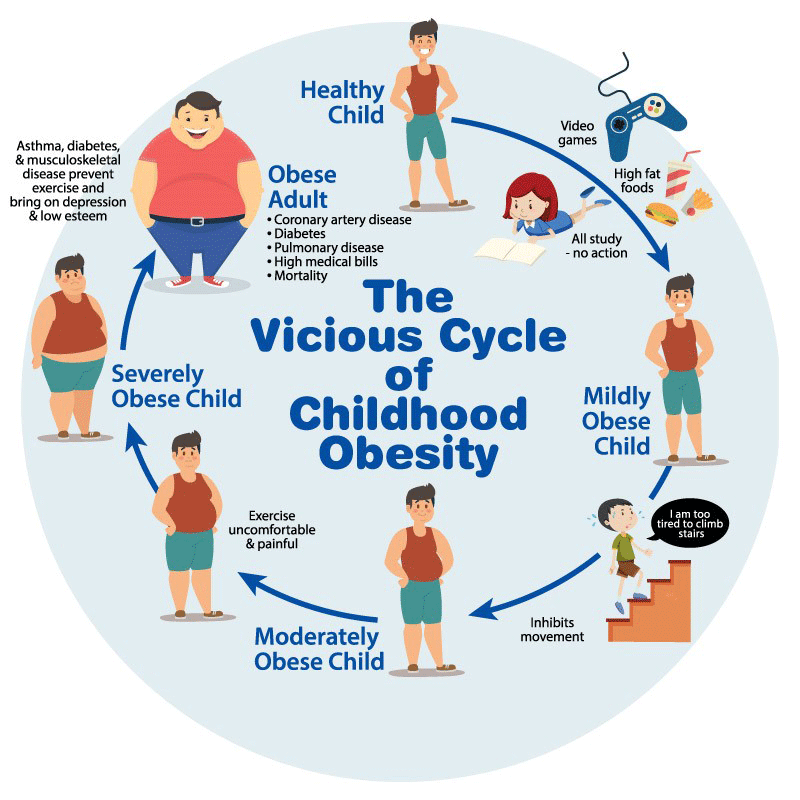In Malaysia, 1 in 4 children is overweight or obese. If childhood obesity is not dealt with in time, it will not only affect the child’s present, but also endanger the child’s future physical and mental health. How can parents help their children get rid of childhood obesity?
1. What is childhood obesity? Definition of childhood overweight and obesity?
Obesity in Malaysia continues. Not only do we surpass all of Southeast Asia, but even our children are just like them where every fifth of those who go to school will be overweight or obese.
Globally, more than 42 million children under the age of five are overweight/obese. In Malaysia, 1 in 4 children/teens are overweight and Malaysia is at the top of the list of countries (in the region) for child obesity with 30% of children registered as obese.
2. What are the causes of childhood obesity?
The problem of obesity among children in Malaysia is becoming increasingly worrying. The body mass is measured on the basis of the body mass index (BMI), and the calculation is as follows:
- BMI = Weight(kg) / Height(m)2
- Overweight: BMI exceeds the percentile 85% (rajah 1)
- Obesity: BMI exceeds 95% percentile
- Serious obesity: BMI exceeds the percentile of 99%
Obesity is caused by over-consumption of calories. Obesity occurs as a result of calorie intake exceeding its consumption. It is generally caused by lifestyle factors such as unhealthy eating habits and low levels of physical activity. The number of cases of obesity caused by medical problems such as hormonal diseases or syndrome is less than 1%.
When parents have obesity problems, children have a greater risk of having the same problem. Children who are overweight usually become obese or obese as adults.
Although genetic factors play a role, external factors such as excessive calorie intake and lack of physical activity play a bigger role. So, nurturing healthy eating habits and an active lifestyle from an early age is very important.
The cultural factors of Malaysian society also play a role in obesity. Malaysia is a multi-ethnic country and famous for its varied food. Food is also available all the time, with 24-hour restaurants all over the country.
Along with rapid economic growth, the calorie intake of Malaysian people has increased. Fast food culture is also quite widespread among our communities. Awareness of a culture of healthy eating is still at a low level. Apart from the food factor, the culture of exercise or outdoor activities with the family in our society is still low.
Complications to Health
Overweight children are exposed to various health risks;
- Type 2 diabetes mellitus: This can occur in children aged eight years.
- Hypertension – Blood pressure rises as a result of excessive weight gain. Prolonged high blood pressure burdens the heart and causes damage to the heart.
- Liver problems – Fatty liver disease (nonalcoholic steatohepatitis or NASH) is common in obese children and can lead to liver failure (liver failures, cirrhosis).
- Oxygen deficiency during sleep due to obstructive sleep apnea: Children with this problem have imperfect sleep, and often experience repeated breathing disorders throughout sleep. They also often snore while sleeping. This condition can lead to death if oxygen deficiency levels deteriorate.
- Coral stones on gallstones – children who are obese have a higher risk of developing this problem.
- Joint damage – This happens because obese children are forced to carry excessive weight all the time. Damage can occur to the leg joints.
- Metabolic syndrome and risk of heart disease – Metabolical syndrome occurs when obese patients also have a combination of other problems such as high cholesterol, high blood pressure, and abnormal glucose levels. This occurs among 30-40% of obese children and they have a much higher risk of heart disease as they age.
- Heart disease – Atherosclerosis is a common problem in obese children. It can occur in early childhood or adolescence, especially in those with metabolic syndrome.
- Menstrual problems – obese girls often experience ovulation earlier than usual. They also have a risk of uterine fibroids and menstrual cycle problems as adults.
- Growing up into fat adults – Obese children usually grow up to fat adults. Half the fat adults are fat in childhood.
- Depression – Obesity problems are often associated with depression and lack of self-confidence. This can lead to difficulty sleeping, less active, overeating and subsequent weight gain in obese patients.
3. How to get rid of and treat childhood obesity?
As a good example to children, obese parents need to lose weight. Starting today, choose a healthy lifestyle. Practice a balanced diet and regular exercise every day. Children will be more interested in making changes in their lifestyle when it covers the entire family.
In addition to parents, schools can also play an important role in fostering a healthy lifestyle for children. Knowledge and awareness are vital weapons in the fight against this problem of obesity.
Early in pre-school, children should be taught about healthy food types, quantities or portions of healthy food, as well as how to recognize and avoid high-calorie foods with low nutrients. They also need to be aware of the diseases associated with obesity.
Tips for Parents to Prevent Obesity in Kids:
- Physical activity every day, for at least 1 hour. It is effective in controlling weight and reducing the risk of disease, in addition to increasing muscle strength. Children should engage in a variety of exciting physical activities such as team exercises, swimming, yoga, cycling, dancing, or walking in the afternoon after dinner. Exercise doesn’t have to be too heavy or too strenuous. Good exercise should involve joint movement and the use of muscles to promote muscle building. For pre-school children, play in the playground or outdoor activities should be encouraged.
- Parents’ support and interest in their children’s activities. The planned activities must be in accordance with the interests and physical abilities of the child. Parents need to monitor their child’s physical activity and make a record using a chart. Praise them if they reach their goal. Parents need to set a good example and make physical activity a family activity.
- Limit sedentary activity, i.e. not more than 2 hours a day (video atau wayang, permainan video, aktiviti komputer). This doesn’t include rehearsals and schoolwork. Avoid using the elevator and increase the use of stairs.
- Encourage children to eat 5 meals of vegetables and fruits every day. Decorate children’s dishes with a variety of colors using tomatoes, broccoli, corn, carrots, potatoes and green beans. Serve fresh fruits like apricots, peaches, lemons and avoid juice.
- Eat on time, i.e. for breakfast, lunch and evening. Without breakfast, children will feel too hungry causing overfeeding later.
- Eat breakfast, lunch and evening at home with family members. Avoid eating while watching TV. Don’t put a TV in a child’s bedroom.
4. Paediatrician’s advice/reminders
It’s best for all obese children to be monitored by a paediatrician. If necessary, your paediatrician will make references to other specialists according to the problems experienced by this child.
Children should be referred to an endocrine paediatrician when there is a possibility that obesity is associated with hormonal diseases, such as thyroid disease, Cushing syndrome or a ‘growth hormone’ deficiency. They should also be referred to when they have complications from obesity such as Sweetheart Disease. (Type 2).
Sometimes these obese kids need the attention of a psychiatrist or a psychologist. Keep in mind that depression or becoming a victim of bullying is often found in children with obesity problems.

Paediatrician,
Pantai Hospital Laguna Merbok.




